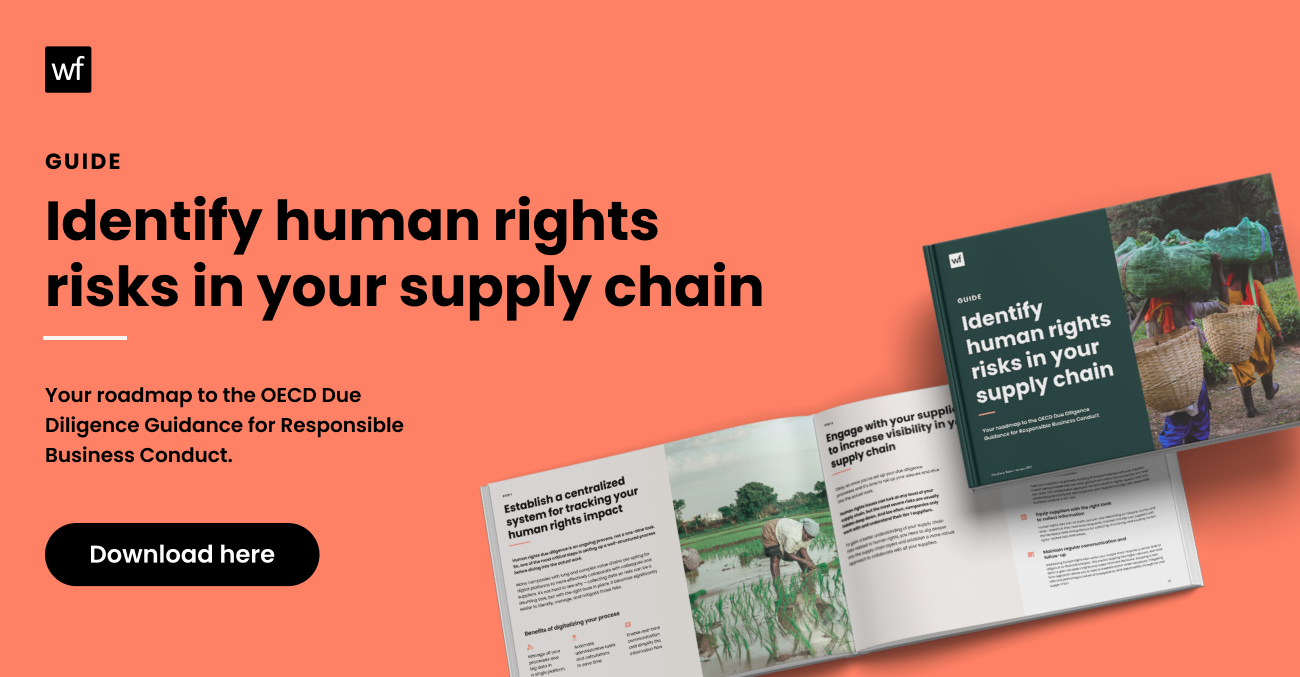The Canadian Modern Slavery Act: fighting forced labor and child labor in supply chains
In January 2023, Canada's long-awaited Modern Slavery Act, formerly known as Bill S-211, came into force, making it mandatory for in scope companies to align and report before May 31st, 2024. Find out what the new Act requires, who's affected, and how to smoothly get started.
Do you need help to set up a process to identify, assess and track human rights risks in your supply chain? Get our free guide here:

Published: August 2023
The Canadian government is urging businesses to put the ‘social’ in ESG at the heart of their strategies.
In 2023, Canada passed its first bill to fight forced labor and child labor in companies far-stretched supply chains. The new Forced Labor Act, formerly known as Bill S-211, will require in scope companies to file their first report before May 31, 2024, meaning it’s high time for companies to get prepared.
Let’s look at how your organization will be affected, important dates to keep in mind and the essential elements to include in your report.
What is the Canadian Forced Labor Act?
The Canadian Forced Labor Act (formerly known as Bill S-211) makes it mandatory to report on forced and child labor in supply chains for companies involved in production, sale, or distribution of goods in Canada or abroad. Effective January 1, 2024, it requires annual reports submitted by May 31 each year, and promotes ESG strategies and due diligence across companies' entire supply chains – not just their Tier 1 suppliers.
Who will be affected by Bill S-211, the Canadian Forced Labor Act?
The Act is applicable to all companies, trusts, partnerships, or other organizations engaged in the production, sale, or distribution of goods in Canada or abroad, importing goods into Canada, or controlling an entity involved in such activities. Plus, the company must be either listed on a Canadian stock exchange or have a business in Canada, conduct business operations within the country, or possess assets in Canada.
To be subject to the Act, companies must meet at least two of the following three criteria (for at least one of its two most recent financial years):
- Has at least 20 million CAD in assets
- Has generated at least 40 million CAD in revenue
- Employs an average of at least 250 employees.

What will the report for the Canadian Forced Labour Act include?
If your company is impacted, an annual report is necessary, covering your efforts implemented to prevent and reduce forced and child labor in both Canadian and international businesses and supply chain activities. The key points to include in your report are:
- Your structure, activities, and supply chains
- Your policies and due diligence processes in relation to forced labor and child labor
- The parts of your business and supply chains that carry a bigger risk (both actual and potential) of forced or child labor being used, plus the steps it has taken to assess and manage that risk
- Any measures taken to remediate any forced or child labor
- Any measures taken to remediate the loss of income to the most vulnerable families that results from any measure taken to eliminate the use of forced or child labor in your activities and supply chains
- The training provided to employees on forced and child labor
- How you assess your effectiveness in ensuring that forced and child labor are not being used in your business and supply chains
Remember, these reports must be made publicly available, including on your website. If your organization is under the Canada Business Corporations Act or another similar law, shareholders must receive the annual report.
With this Act in place, taking responsibility for what’s happening across your supply chain is no longer optional, but a must. In a nutshell, the Act wants companies to look more closely at how they manage and understand risks related to how people work in their supply chain. When the people in charge of the company (boards) pay better attention, it can really help make sure everyone is treated fairly and ethically throughout the whole chain.
When will the Act come into effect?
Bill S-211 comes into effect on January 1, 2024, and the annual reports, approved by the governing body, must be submitted by May 31 each year, starting in 2024. It's crucial to be aware that organizations failing to submit a satisfactory and public annual report may face fines of up to 250 000 CAD.Report ESG data with Worldfavor
With 2024 and the Act’s first reporting deadline almost here, it's about time to start figuring out what's really going on in your supply chain. Worldfavor's ESG platform is an effective solution to help your company connect with all your suppliers and business partners to ensure transparency throughout your entire supply chain. Easily manage extensive data for the required annual reports, while Worldfavor's support ensures seamless alignment and compliance with the evolving landscape.
Curious to know more about how we can help you? Let’s get in touch today!
Related blog posts you might like:





%20as%20the%20deadline%20approaches.%20Learn%20about%20compliance%20requirements%2c%20potential%20delays%2c%20and%20key%20updates..png)

